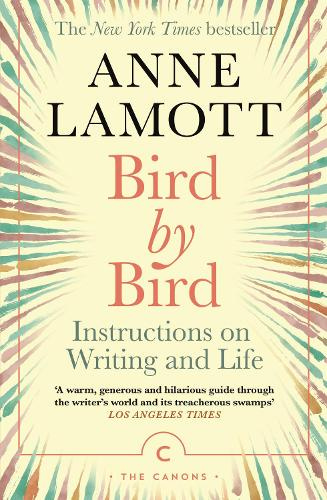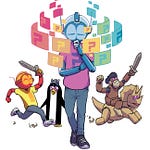If you like people who have the letter ‘K’ as a middle initial, you’re in the right place.
We’re swamped with advice about how to write and be a writer. I’m guilty of adding to that pile, I suppose. The problem with writing advice is that its usefulness varies wildly, and you have to dig through cynical slop by grifters to find the good stuff.
I use the same approach for writing advice that I do for critics. A reviewer that purports to be presenting a scientific, objective assessment of a piece of art is wasting my time, because there is no such thing. Far more preferable is the reviewer that makes it personal.1 Mark Kermode is a film critic I can always rely upon, not because I always agree with him but because I know what makes Mark Kermode tick and can transpose his opinion into what I might think.2
Bird by Bird is a book about writing that is also about its writer, Anne Lamott. It’s as much an autobiography as it is a writing guide, shifting back and forth throughout. By making it about the writing life, Anne gives context to everything else. It elevates the book from a list of useful tips to something far more impactful, moving and — yes — useful.
The insight into plot, character, themes, motivation, consistency are not simply marking off the usual checklist, but are drawn directly from her own experiences. She shares the victories and disappointments of her writing life, the difficulties along the way, the awkward reality of being a writer. None of the biographical material is indulgent, as it always serves the wider point that is being made.
Originally published in the early 90s, Bird by Bird only reached UK shores in 2020. It’s a bizarrely long gap (the Atlantic is quite wide, to be fair) and there are inevitably moments where the book has dated: there’s no real awareness of the internet, or of mobile phones. Computers are barely present, with the focus always on index cards and analogue approaches. Finding an agent and a traditional publisher is the only game in town, so don’t go in expecting advice directly relevant to the modern publishing landscape.
But if you want a book that helps to make sense of being a writer, and of the odd thing that is the writing life, while at the same time bringing into focus the nuts and bolts of how to craft a story: this is the one. It’s an unexpectedly moving and spiritual read, and is about as far from vacuous online writing gurus as you can get.
In the video above, you’ll find me discussing Bird by Bird with
and , originally livestreamed on April 1st. We discuss the book, how it relates to our own writing, and thoughts on ‘writing advice’ in general.And, yes, it is quite peculiar that we all have ‘K’ as our middle initial.
Meanwhile.
It’s the Easter school holidays here, which means a) hanging out with my son, which is the best time and b) having far less time to write. This year I’m also switching jobs (I start at the Creative PEC tomorrow), so my brain is having to be extra malleable.
Some bits I’ve been enjoying:
I’ve been making my way through the Sable Design Works art book for a while, which is a glorious thing. I need to go back to the game itself, which I never finished.
On a similar note, the Citizen Sleeper Design Works is also a sight to behold. If I ever have a go at making my own narrative-led video game, which might be one of my post-Triverse projects, Citizen Sleeper is a very appealing model. Its creator has their own newsletter which is over at
. Currently I’m deep into the recently released sequel, which is excellent.‘Balancing the books’ by
is worth reading, not least for its opening hook: “The publishing industry and its surrounding media have spent years telling men to fuck off.” Also the counterpoint: “It’s not publishing’s fault if some men have gonads where they should have brains and somehow feel that reading Sally Rooney or Chimamanda Adichie is going to hurt them.” It’s an empathetic, challenging piece that is trying to take a more nuanced look at the publishing landscape.‘The Case of the Missing Black Author’ is also talking about representation in the publishing industry. The general impression I get is that traditional publishing is inherently wonky and always has been, shifting in various directions but rarely finding a healthy balance. Long-term, the risk is that readers will go elsewhere to find themselves in stories. That could mean going to indie publishing, online writing, serialisation and so on — or, as in the case of Sam’s article, it could mean abandoning reading altogether.
Right, I’ll leave it there for today. I’ll be back on Wednesday for those of you on the Babylon 5 rewatch, and then there’ll be a new chapter of Tales from the Triverse on Friday.
This has also turned out to be the best response to AI slop.
The absolute worst are magazines which publish anonymous reviews and present it as the house opinion. What’s the point?















